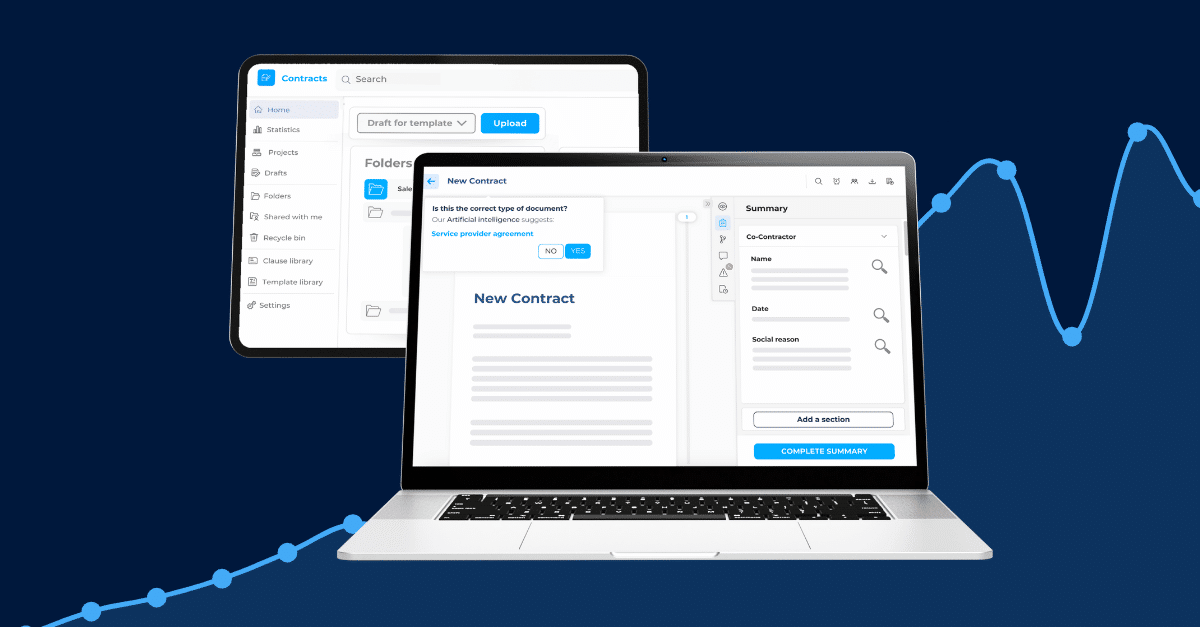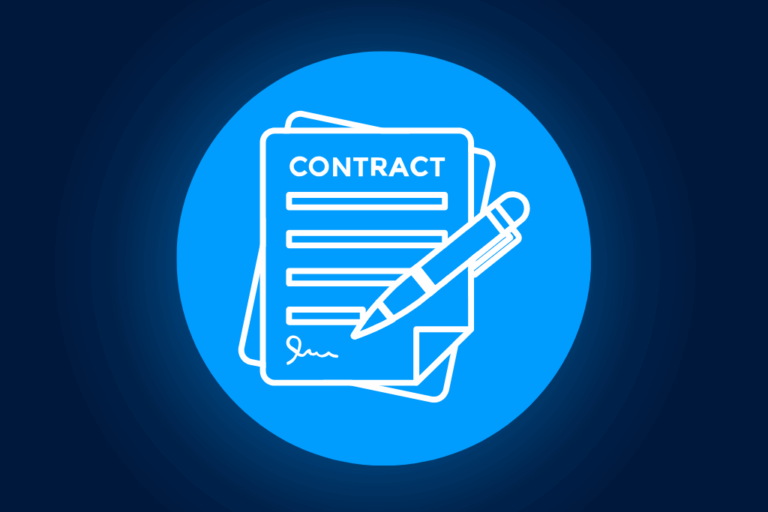All companies have to manage a certain volume of contracts. When this volume becomes sizeable (in other words, roughly 40 or more contracts per month), manual contract management becomes problematic: it can end up wasting a lot of time – and even money!
That is why a growing number of companies are opting to automate their contract management processes by turning to contract management software. So what benefits can these tools offer, and what can we expect from them?

What is Contract Management?
Definition of Contract Management
Contract management encompasses all actions involved in managing a contract’s lifecycle. This process covers everything from contract creation to execution, including negotiation, drafting, and compliance monitoring. The goal is to ensure that all contractual clauses are met while optimizing the relationship between the involved parties.
Effective contract management in a business setting helps mitigate risks, ensures compliance with contractual objectives, and enhances overall service performance. Moreover, it significantly reduces financial costs. This discipline is relevant across multiple sectors, including law, finance, project management, and procurement.
The Evolution of Contract Management
In the past, contract management was limited to legal validation and document storage. Like many legal activities, it was entirely manual. However, with the rise of new technologies, contract management has evolved to incorporate automation and analytical tools. These LegalTech solutions simplify contract processes and enhance transparency.
With business projects becoming increasingly complex, contract management has transitioned into a critical function. It is no longer just about archiving documents; rather, it involves optimizing every step to maximize service value and minimize risks.
The Stages of a Contract’s Lifecycle
1. Drafting
Drafting is the first and most crucial step. At this stage, the goal is to create a document that meets project needs while adhering to legal requirements. A well-structured contract ensures clarity and prevents misunderstandings.
An effective draft saves time during negotiations and minimizes potential disputes. Therefore, it is essential to adopt a clear structure and address legal, financial, and operational aspects.
2. Negotiation
After drafting, the negotiation phase aligns the contract with the expectations of all parties involved. For example, if a company signs a contract with a web agency, key commitments may include delivery deadlines and project milestones.
A successful negotiation results in a balanced agreement. It also incorporates risk management mechanisms and guarantees that protect both parties.
3. Signing
The signing phase officially seals the contract, committing all parties to the agreed terms. Thanks to digitalization, electronic signatures now streamline this process, making it both faster and legally secure.
After signing, it is crucial to share the contract with all stakeholders and integrate it into a structured monitoring plan.
4. Monitoring and Compliance
Ongoing contract monitoring ensures that all commitments are honored. This step involves tracking deadlines, evaluating performance, and handling unforeseen changes. Effective monitoring maintains contract compliance, optimizes costs, and mitigates risks.
With the help of digital tools, businesses can now anticipate potential disputes more effectively, improving collaboration between all involved parties.
Who Oversees Contract Management?
The Role of the Contract Manager
The contract manager ensures the smooth execution of contract management. This role requires expertise in law, finance, and project management.
The contract manager is involved from the negotiation stage through execution, handling risk assessments, modifications, and conflict resolution. To succeed, they must possess strong analytical and problem-solving skills.
The Role of the Legal Team
The legal team plays a crucial role in contract validation and monitoring. Their expertise ensures legal compliance and safeguards the company’s interests.
They also contribute to training operational teams, enhancing their understanding of contract-related risks and best practices.
Advantages of a Contract Management Tool
1. Considerable time savings
Managing large volumes of contracts manually is highly time-consuming. In fact, this is probably the number one reason why companies seek to automate this task. Unsurprising, given that 62% of legal departments believe that their workload is set to increase over the next few years, according to data from consultancy firm Day One.
The reason contract management is so time-consuming is that a contract’s lifecycle does not end with its signature: companies also need to account for monitoring its performance, keeping an eye on deadlines, any future amendments, and tacit renewals.
When all these elements are managed manually, the risk of error is much higher, and any mistakes can prove costly for the company. As such, employees devote hours upon hours carefully reading, classifying and checking the information in each contract.
Not to mention all the work poured into the document before it is even signed, which often involves long, tedious exchanges in an effort to have it approved.
Thanks to contract management technologies, these tasks are now by and large automatable.
Indeed, some contract management software has built-in artificial intelligence which scans the text of contracts to pick out the key clauses and information (counter-parties, dates, etc.).
As such, they save time at the drafting and approval stages thanks to highly-configurable contract templates and approval workflows. What is more, according to the same study, contract management makes negotiations 50% faster.
2. Centralizing contracts and simplifying everyday tasks
Contracts are legal documents that pass through the hands of multiple parties: legal experts, of course, but also sales, purchasing, financial and even human resources departments. Not to mention all the parties outside the company (clients, suppliers, etc.)!
More often than not, this results in long, drawn-out email exchanges, which waste time and create oversights and errors in the confusion: something few companies can afford to deal with.
With contract management software, on the other hand, all the company’s contracts are centralized and accessible through a tool known as a contract library, which keeps them all together in a single location. This greatly simplifies exchanges and discussions, especially now that remote working is becoming the norm.
The tool also helps streamline day-to-day contract-related tasks, namely:
- searching for information, made considerably easier thanks to a smart search engine;
- approval processes, automated by way of a customizable workflow;
- contract drafting, thanks to a clause library and templates;
- deadline management, made simple with a system of reminders for key dates.
Saving time translates into a huge boost in efficiency and productivity, and automated contract management can very quickly help companies sign more contracts!
3. Bolstering contract security and compliance
Storing all your contracts in a single, secure online contract library is an excellent option for ensuring the security of your documents. No more accidental losses or information leaks!
One might think of losing a contract as a rare event; however, the study shows that companies do not know where 10% of their contracts are. Centralizing all your contracts eliminates this uncertainty entirely, which increases the control you have over your data.
Smart detection of the key clauses and data in each contract also makes drafting and monitoring them more reliable. The risk of error and non-compliance is greatly reduced, potentially even erased, as compared with manual management.
In Conclusion
In conclusion, successful contract management is important for every business looking to improve efficiency, reduce costs, and manage contracts more effectively across teams. By using modern contract management software, businesses can get significant benefits from better visibility of contract data, actionable insights, and more effective lifecycle management. With the help of a centralized contract management system, companies can identify potential risks, streamline the contract process, and ensure regulatory compliance throughout the entire contract lifecycle.
Moreover, contract management software can simplify interactions between people and departments, helping to avoid disputes and offering valuable support in meeting terms and conditions. It allows teams to stay ready and responsive, ensuring that no important deadlines or compliance requirements are missed.
The benefits of contract management are particularly clear when businesses look to help their teams focus on new opportunities rather than getting bogged down by inefficient processes. Effective contract management can help unlock the full potential of contractual relationships by offering the best insights and practices for every case.
Adopting an effective contract management approach with the right tools is no longer optional, it’s a necessary step for any organization that wants to thrive in today’s competitive environment.
The DiliTrust Contracts module, a comprehensive solution that can simplify all aspects of contract management
The Contracts module by DiliTrust is a SaaS contract management solution which can be easily integrated into all your existing tools (word processors, CRM platforms, electronic signature tools, etc.). This software stores all your contracts in a single database, making collaboration and remote working simpler than ever before.
It has a whole host of features designed to make managing contracts throughout their lifecycle a great deal less demanding:
- clause library and contract templates
- electronic signature
- approval workflows
- change log for all contracts
- automatic deadline reminder system
- statistical dashboards
- fully secure storage.
From creation to signature, you need never again lose track of the changes made to your contract. The approval process is secure thanks to a configurable workflow, while the electronic signature feature saves you a considerable amount of time. Automatic reminders, meanwhile, help you to prevent losses due to tacit renewals and alert you to any unfair clauses identified in the contract.
All of these features greatly simplify and reduce the day-to-day workload of legal experts, sales representatives, and all other employees who have occasion to handle contracts. The bottom line: there are huge savings to be made in terms of time, energy and money!
Frequently asked questions
Contract management is responsible for managing and optimizing a company’s contractual relationships. A uniform structure for all processes enables employees to find the contract information they need quickly and without inconsistencies.
A contract manager is responsible for the entire lifecycle of contracts within a company. Responsibilities include drafting, negotiating, reviewing, and managing contracts to ensure that the terms of the contract are consistent with and meet the company’s objectives. Major tasks also include coordinating with other departments such as legal, procurement and finance, monitoring deadlines, and developing contract management processes.
Whereas contract manager have experience in negotiating and drafting contracts, ensuring compliance with regulations, and maintaining relationships with customers and suppliers, legal advisors focus on providing legal consultation and representing their clients.
You may also like this content:
Want to find out more about our CLM software? Reach out to one of our experts!



